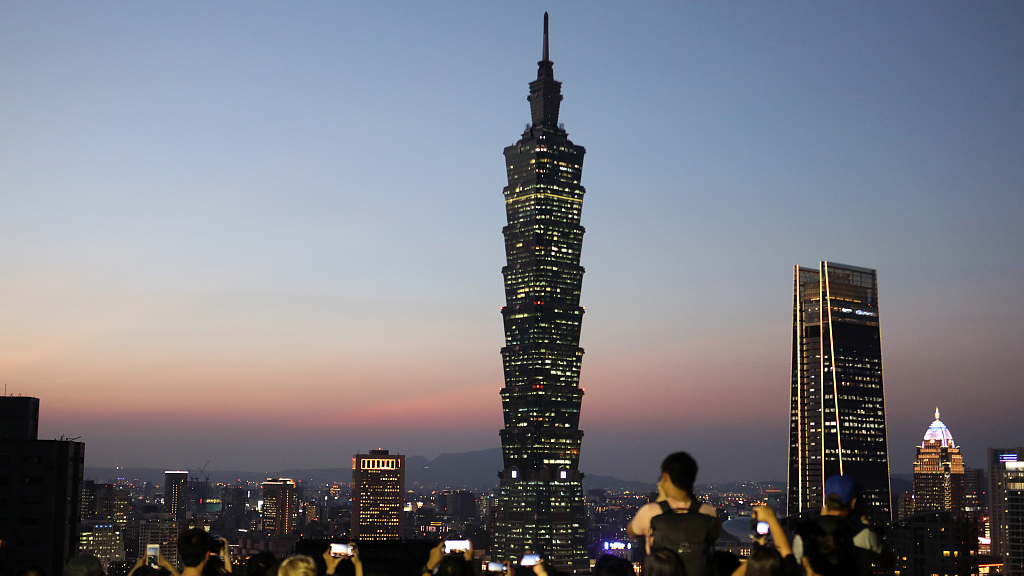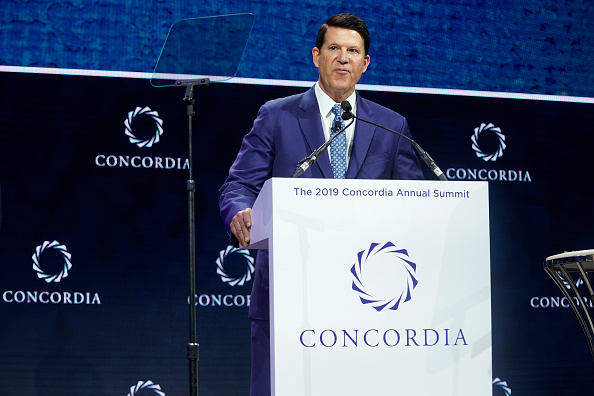
Editor's note: Zhang Hua is an associate research fellow at the Institute of Taiwan Studies of the Chinese Academy of Social Sciences. The article reflects the author's opinions, and not necessarily the views of CGTN.
On September 17, U.S. Under Secretary of State Keith Krach arrived in Taiwan as one of the most senior U.S. diplomats visiting since the termination of diplomatic relations between Taiwan and the United States in 1979. By taking this move, the U.S. is undoubtedly playing the "Taiwan card" against China and seeking to contain China by using Taiwan as a leverage.
However, the low-profile schedule of Krach's trip to Taiwan also shows that the U.S. and Taiwan are not ready for a complete showdown with the Chinese mainland. Nevertheless, Krach's visit seriously undermines the political foundation of the China-U.S. relations and aggravates tensions across the Taiwan Strait. The Trump administration and the Democratic Progressive Party (DPP) authorities will certainly pay a hefty price for it.
Krach's visit is a detrimental tactic deployed by the Trump administration to contain China, and the damage it has done is greater than Health Secretary Alex Azar's visit to Taiwan in mid-August. Against the background of China-U.S. strategic competition, the U.S. has pulled a number of tricks - such as arms sales to Taiwan, support for Taiwan's participation in international organizations, and mutual visits by high-level U.S. and Taiwan officials.
Since the beginning of this year, the U.S. has signed multiple weapon deals with Taiwan. For example, it approved the sale of heavy-weight torpedoes to Taiwan in May and the upgrade package of Taiwan's Patriot Advanced Capability-3 (PAC-3) air defense system in July. The U.S. also promised to sell advanced drones and missiles to Taiwan. It also openly expressed its support for Taiwan's participation during the World Health Assembly, and it's said to fully support Taiwan's participation in the United Nations during the UN General Assembly in September.
When all these tricks have been played, it's not surprising that senior U.S. officials are sent to visit Taiwan. After all, the U.S. enacted the so-called "Taiwan Travel Act" in 2018. The law requires the U.S. administration to send high-level officials to visit Taiwan. In August this year, the U.S. Health Secretary Alex Azar visited Taiwan, becoming the first U.S. cabinet official to visit Taiwan since 2014. Although Krach's rank is below Azar, his position is more sensitive, which makes his visit more damaging to China-U.S. relations than Azar's.

Keith Krach, Under Secretary For Economic Growth, Energy, and the Environment, U.S. Department Of State, speaks onstage during the 2019 Concordia Annual Summit - Day 2 at Grand Hyatt New York on September 24, 2019 in New York City. /Getty Images
Keith Krach, Under Secretary For Economic Growth, Energy, and the Environment, U.S. Department Of State, speaks onstage during the 2019 Concordia Annual Summit - Day 2 at Grand Hyatt New York on September 24, 2019 in New York City. /Getty Images
When it comes to international politics, diplomats are significantly more representative of a nation than health officials. Moreover, back in the 1990s, there were visits to Taiwan by secretaries of non-sensitive departments of the United States (i.e. the Secretary of Energy), but there has never been a visit to Taiwan by diplomats at the level of Under Secretary of State or above.
However, the U.S. and Taiwan authorities are not ready for a complete showdown with the Chinese mainland. With the news that Krach might visit Taiwan emerging at the end of August, the DPP authorities and Taiwan's media created much fanfare by saying that Krach was scheduled host the new U.S.-Taiwan Economic and Commercial Dialogue, a new platform established to discuss issues such as 5G, information security, and decoupling from Chinese mainland.
However, after the Chinese mainland expressed serious concerns to the United States and Taiwan through various channels, Krach's itinerary went through a major revision. He will not preside over the economic dialogue, nor will he sign any U.S.-Taiwan investment and trade agreement. Instead, he will only attend a memorial service for Lee Teng-hui. What's more, Krach's trip to the island was extremely low-key, because it's not as publicized as Azar's visit to Taiwan was.
As a result, the sentiment of the DPP authorities and Taiwan's media cooled down dramatically. The reason is that although the U.S. wants to play the "Taiwan card" against China and hopes to use Taiwan to undermine China's integrity, it clearly understands the sensitivity and significance of the Taiwan issue. If Beijing exerts enough pressure, Washington will take a few steps back. On the other hand, although DPP authorities want to have the support of the United States, they are fully aware of the possible consequences of a substantially closer relationship between the U.S. and Taiwan, so it avoids to take excessive risks.
The Taiwan issue concerns China's core interests, touches the feelings of the Chinese nation, and is an inextricable part of the Chinese Dream of the great rejuvenation of the Chinese nation. Therefore, China won't turn a blind eye to a substantially closer relationship between the U.S. and Taiwan. On September 18, multiple batches of fighter jets and bombers from Chinese mainland crossed the "Taiwan Strait median line" to deter the Taiwan authorities and pro-Taiwan forces of the U.S. with a robust show of force. The spokespersons for the Chinese Ministry of National Defense, the Ministry of Foreign Affairs and the Taiwan Affairs Office of the State Council also publicly stated that the military actions in the Taiwan Strait were a response to the latest development across the Taiwan Strait and the Taiwan authorities colluding with foreign forces. China is fully confident and capable of safeguarding national sovereignty and territorial integrity. But, if the DPP authorities continue to collude with the United States, peace across the Taiwan Strait will be difficult to maintain.
(If you want to contribute and have specific expertise, please contact us at opinions@cgtn.com.)